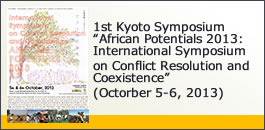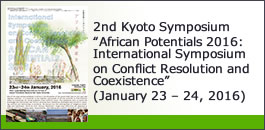[21th Plenary Committee Meeting / 2nd Kyoto Symposium] “African Potentials 2016: International Symposium on Conflict Resolution and Coexistence” (January 23 – 24, 2016)
Date: January 23 – 24, 2016
Venue: Large meeting room (333) on 3rd floor of Inamori Foundation Memorial Hall, Kyoto University
Outline
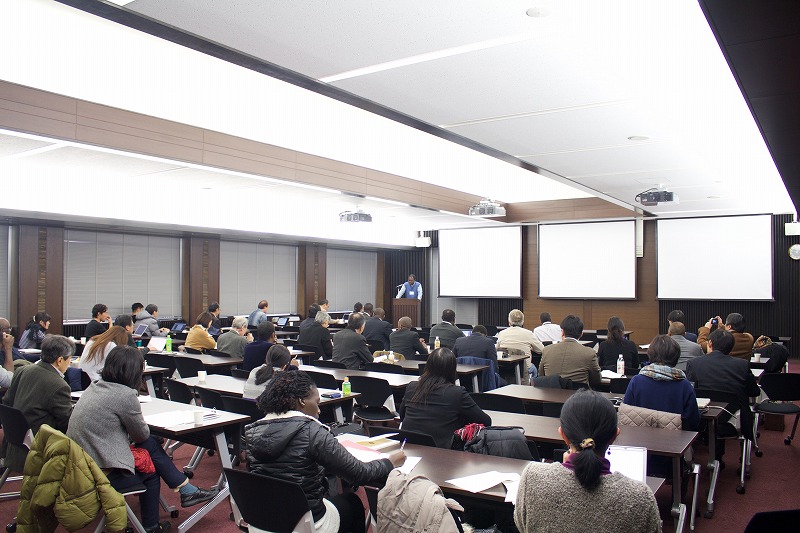
This research project started in 2011 as a five-year project, and this symposium was held in Kyoto as the final international symposium. The meeting had two objectives.
In this research project, we held ‘African Forums’ annually in different cities in African countries, inviting African researchers, in order to strengthen our idea of ‘African Potentials.’ In this process, a group of regular members was created, which provoked serious discussions, and deepened our thoughts on ‘African Potentials’. In this Kyoto symposium, we invited these regular members to finalize our discussion on ‘African Potentials,’ and to exchange our ideas how we can proceed in future. This is the first objective of this symposium. These regular members are:
- Edward Kirumira (Makerere University, Uganda)
- Kennedy Mkutu (United States International University, Kenya)
- Michael Neocosmos (Rhodes University, South Africa)
- Samson Wassara (University of Bahr El Ghazal, South Sudan)
- Francis Nyamnjoh (University of Cape Town, South Africa)
- Yntiso Gebre (Addis Ababa University, Ethiopia)
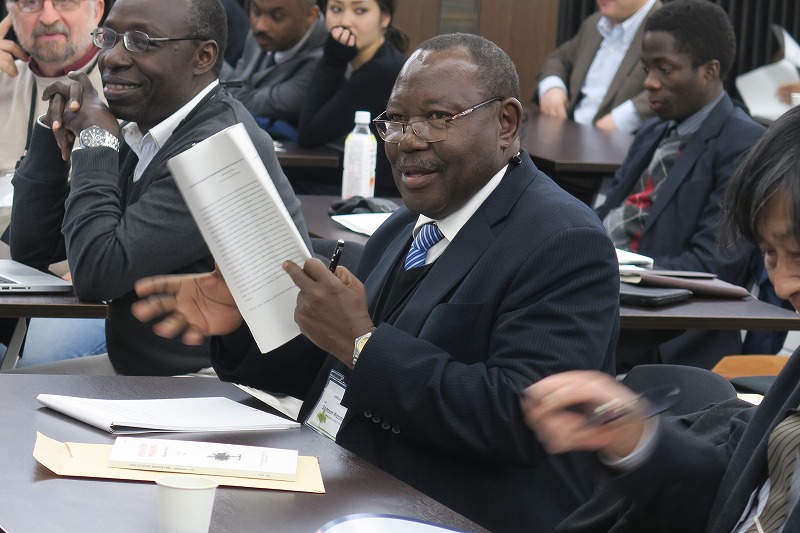
The second objective of this symposium was to announce the publication of five books in Japanese, as a result of this research project which had more than 50 Japanese members. These books will come out by the end of March 2016, published by Kyoto University Press. The project leader and five editors of these five books made presentations in which results of this project were summarized.
In the end of this symposium, presenters of the meeting agreed to publish a book on ‘African Potentials’ in near future in English.
Program
January 23 (Saturday), 2016
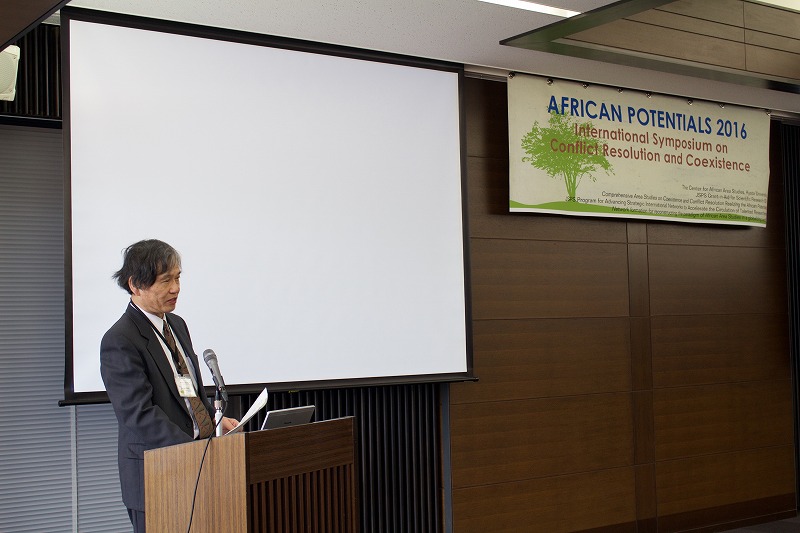
- 10:30 – 10:40
- Welcome Address: Shigeki Kaji (Kyoto University)
- 10:40 – 10:55
- Opening Remarks: Itaru Ohta (Kyoto University)
- 10:55 – 11:00
- Introduction of the Keynote Speaker: Motoji Matsuda (Kyoto University)
- 11:00 – 11:45
- Keynote Speech: Edward Kirumira (Makerere University)
African Potentials and Sustainable Development - 11:45 – 12:00 Discussion
- 12:00 – 13:30 Lunch
- 13:30 – 14:05 Kennedy Mkutu (United States International University)
- New Challenges for African Potentials in Meditating Cross Border Conflicts
- 14:05 – 14:40 Michael Neocosmos (Rhodes University)
- The Universality of Humanity as an African Political Potential
- 14:40 – 15:15 Samson Wassara (University of Bahr El Ghazal)
- African Potential in Negotiating Statehood: Handling Crises of South Sudan
- 15:15 – 15:35 Break
- 15:35 – 16:10 Francis Nyamnjoh (University of Cape Town)
- Incompleteness and Conviviality: A Reflection on International Research Collaboration from an African Perspective
- 16:10 – 16:45 Yntiso Gebre (Addis Ababa University)
- Systematizing Knowledge about Customary Laws in Africa: The Case of Ethiopia
- 16:45 – 17:10
- Comments (by five Japanese scholars on above five presentations: 5 minutes each)
- 17:15 – 18:15
- Discussion
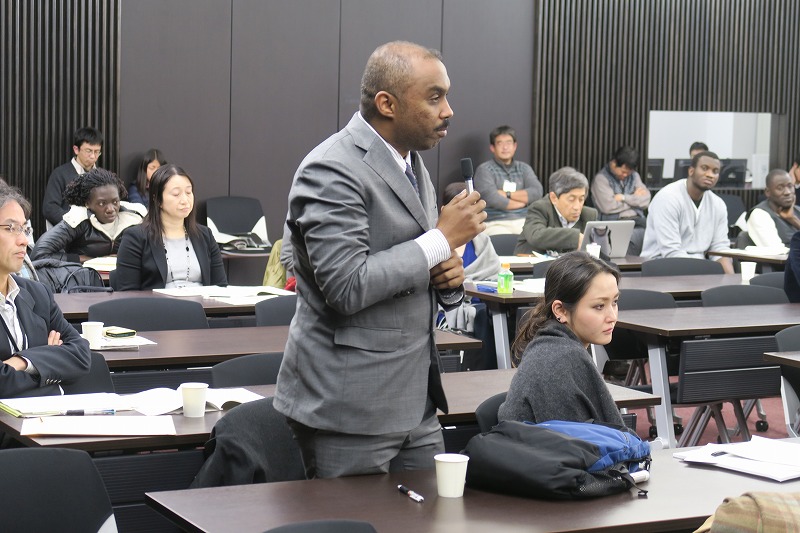
January 24 (Sunday), 2016
- 10:00 – 10:35 Itaru Ohta
- “Liberal Peace” Debates and African Potentials for Materializing Coexistence
- 10:35 – 11:10 Motoji Matsuda (Kyoto University)
- Cultural Creativity for Conflict Resolution and Coexistence: From the Viewpoint of African Potentials
- 11:10 – 11:45 Shinichi Takeuchi (Institute of Developing Economies)
- African Potential as an Analytical Perspective
- 11:45 – 12:20 Motoki Takahasi (Kobe University)
- People as Lithe Agents of Change: African Potential for Development and Coexistence
- 12:20 – 13:50 Lunch
- 13:50 – 14:25 Masayoshi Shigeta (Kyoto University)
- How People Can Achieve the Coexistence through the Sound Use of Resources?
- 14:25 – 15:00 Gen Yamakoshi (Kyoto University)
- Who Owns African Nature? African Perspectives on the Future of Community-Based Conservation
- 15:00 – 15:20 Break
- 15:20 – 16:20
- Comments on these six presentations by six African scholars
- 16:20 – 17:00 General Discussion
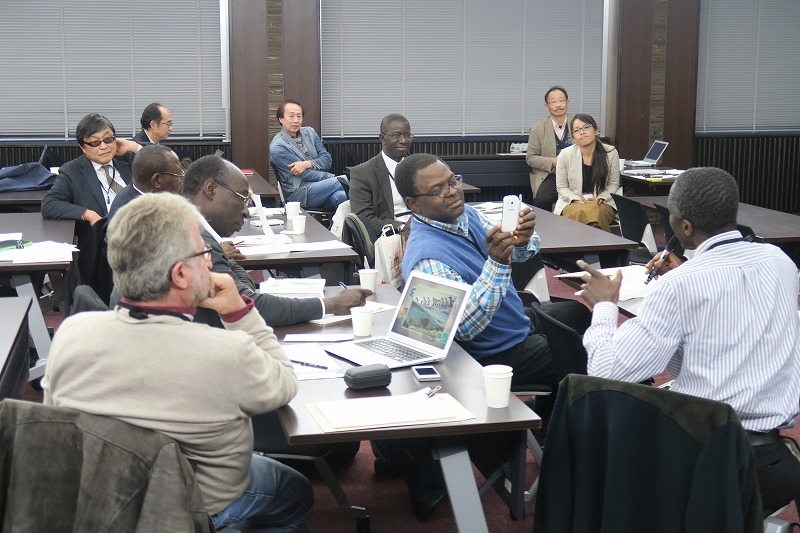
[19th Plenary Committee Meeting / 5th Public Lecture] “Considering Violence in Africa: From Massive Conflict to Terrorism” (January 24, 2015)
Date: January 24, 2015
Venue: Inamori Foundation Memorial Bldg. (Inamori Center), Large-sized Room
There were massive conflicts during the period of 1990s to 2000s, but we can recognize the emergence of terrorism in contemporary Africa. The militant groups are small unit and they have aggressive actions cross the national borders. We invited famous researcher, a former journalist for this public workshop and provided opportunity to rethink violence in contemporary Africa.
Program
15:00-15:10
Opening remarks
Ohta, I (Kyoto University)
15:10-16:30
Considering Violence in Africa: From Massive Conflict to Terrorism
Keiichi Shirato (Mitsui Global Strategic Studies Institute)
16:30-17:00
General Discussion
[18th Plenary Committee Meeting] Special forum “For the Yaounde Forum 2014” (November 8, 2014)
Date: November 8, 2014. 14:00-17:30
Venue: Middle-sized Meeting Room, Inamori Foundation Memorial Building, Kyoto University
Program
14:00-14:10 Misa Hirano-Nomoto (Kyoto University)
“Statement of purpose: For the Forum in Yaounde”
14:10-14:35 Hisashi Matsumoto (Yokohama National University)
“Immigrants and Chieftaincy Titles: African Potential and Traditional Authority”
14:35-15:00 Hidetoshi Kondo (Kansai University of Foreign Studies)
“Enchanted Transition of Relations: Reconsidering the Conflict Relationship in Witchcraft Research in Africa”
15:00-15:25 Takao Shimizu (Research Institute for Humanity and Nature)
“Non-resistant Acts for the Survival of Marginalized Muslims: Reproduction of Muslims in Burkina Faso”
15:25-15:40 Coffee/Tea Break
15:40-16:05 Hideyuki Okano (Osaka University)
“Public Authorization of the Informal Sector: Case Study of the Motorcycle Taxi Industry in Post-conflict Sierra Leone”
16:05-16:30 Takanori Oishi (Research Institute for Humanity and Nature)
“Conflicts Over Land in the Recent Cacao Production Expansion Process in South-Eastern Cameroon: Inter-ethnic Negotiation and Cultural Propagation in a Multi-ethnic Setting”
16:30-17:30 General Discussion
Report
“Statement of purpose: For the Forum in Yaounde”
Misa Hirano-Nomoto (Kyoto University)
A briefing was given for the international forum in Yaounde held on the 5th and 6th of December, 2014, including the preparation updates, purpose of the forum and the structure of the sessions. After the presentation, summaries by keynote and other speakers were explained, and the purpose of the day’s plenary committee meeting was shared.
“Immigrants and Chieftaincy Titles: African Potential and Traditional Authority” Hisashi Matsumoto (Yokohama National University)
The society of the Igbo people, one of the three largest ethnic groups in Nigeria, previously had a decentralized social structure, but titles such as king and chief have recently been created and awarded. The Igbo are known as “traders” or “migrants”. Each region has successful traders, and some of them receive titles. This trend is sometimes criticized as a trade of titles. People who have received such titles wear costumes symbolizing chiefs and give handshakes in a certain way. People pay respect to them at occasions. There are three ways of awarding titles: (1) titles granted by the home communities as a token of their support of the communities, (2) titles granted by communities other than the home community, and (3) titles and communities created by the grantees themselves. In the event of the third case, they divide their home communities and have newly installed titles of kings and chiefs. In any event, dispersed migrants in different regions obtain links to their home communities through receiving such titles. The relationship between the migrants and their home communities is reconstructed through the awarding of titles.
“Enchanted Transition of Relations: Reconsidering the Conflict Relationship in Witchcraft Research in Africa” Hidetoshi Kondo (Kansai University of Foreign Studies)
In previous research on witchcraft in Africa, the focus of confrontation between those who curse and those who are cursed has been set against the rich and the poor. For example, in understanding witchcraft from the point of view of the rich, they have often explained that the poor envy the rich and put pressure on the rich with regard to the distribution of the wealth. Some studies have suggested that the poor believe that those who curse are the rich because they use the poor as a labor force with help of witchcraft from the poor’s perspective. However, many of these studies have postulated that people’s behavior is based on economic rationality, while simultaneously analyzing the witchcraft through the filter developed by the researchers’ own way of living. The reporter mentioned that his observation and analysis of each case of witchcraft showed that people seek reasons for the witchcraft in order to understand inexplicable unhappiness or irrational differences. Those who were seen as witches did not live like witches, but lived everyday life that was not different from that of other people. However, they recognize their power as witches when they face unreasonable unhappiness.
“Non-resistant Acts for the Survival of Marginalized Muslims: Reproduction of Muslims in Burkina Faso” Takao Shimizu (Research Institute for Humanity and Nature)
Followers of Islam are marginalized in Burkina Faso. Young Muslims in rural areas migrate for seeking farming land, while those in cities live by being fakir (mendicant). In recent years, Muslims have founded and expanded the Franco-Arab school, which is similar to a Qur’anic school with a modern school education curriculum. The phenomenon can be seen as being supported by their intention to expand the Muslim community by modernizing “schools” that reproduce the followers of Islam.
“Public Authorization of the Informal Sector: Case Study of the Motorcycle Taxi Industry in Post-conflict Sierra Leone”
Hideyuki Okano (Osaka University)
The number of motorcycle taxis increased rapidly after the end of the civil war in Sierra Leone, and they serve as the basic means for travel today. In the beginning, this was an industry run by former soldiers, but many of the younger generation have now entered the industry. As the institutionalization of the motorcycle taxi industry has advanced, the Commercial Motorcycle Drivers Union was founded in 2012 by unifying pre-existing voluntary associations. The Union’s activities include (1) solving problems that have occurred between drivers and passengers, the police and the owners of the motorcycles, (2) the collection of insurance premiums and providing insurance for the drivers, and (3) managing the drivers and collecting fines from those who violate the regulations. A former member of a local NGO played a role as being in charge of administration work, and this clarified the role of the Union as an organization for public purposes. The Union is structured according to four levels, namely community, county, state and national levels, and the officials in the upper levels are supposed to be elected by the officials at the lower levels. As a result of the introduction of this electoral system, the negative aspects of African politics, such as violence at elections, profit-driven politics and corruption, have been appearing.
“Conflicts Over Land in the Recent Cacao Production Expansion Process in South-Eastern Cameroon: Inter-ethnic Negotiation and Cultural Propagation in a Multi-ethnic Setting”
Takanori Oishi (Research Institute for Humanity and Nature)
A study of the potential of forest and other conflicts regarding the utilization of the forest in the case of the Baka Pygmies, hunter-gatherers in southeastern Cameroon, was reported. Past studies reported the presence of a coexistent ecological relationship between agriculturists and hunter-gatherers in African tropical forests, but migrants who settled in the research area came to be found in the 1980s when a logging company arrived in the area. Many such migrants are Muslims from northern Cameroon or the Sahel region in West Africa, and they often engage in commercial activities. In the area, cacao cultivation expanded during the 1980s and 1990s, and differences in the size of cacao farms owned by individuals has increased. At the same time as trading of such open cacao farms developed, the lease agreement came to have a certain direction, first from Baka Pygmies to the Bakweri, and then to the Hausa. This flow resulted in migrated commerce-oriented ethnic groups obtaining large-scale cacao farms. The progression of such a flow may become the causes of more serious conflicts in the future.
Plenary Discussion
In the general discussion, there was a comment suggesting the international forum in Yaounde may address the globalization of the economy as a common topic, rather than focusing on a framework based on the regional characteristics of West Africa. In addition, Prof. Ohta, the project leader, requested the presenters to amend their reports based on a consideration of the topics delivered by other speakers at the forum.
[17th Plenary Committee Meeting] Special forum “Dimensions of International relations towards conflict resolution by utilizing African Potential” (July 19, 2014)
Date: July 19, 2014. 13:30-17:30
Venue: Middle-sized Meeting Room, Inamori Foundation Memorial Building, Kyoto University
Program
13:30-14:00 Business Meeting
14:00-17:30 Special forum “Dimensions of International relations towards conflict resolution by utilizing African Potential”
Program of Special forum
14:00-14:10 Mitsugi Endo (Tokyo University)
Introduction
14:10-14:50 Kyoko Cross (Ritsumeikan University)
Transitional Justice and Women: Examining Women’s Role as Agents in the Peace-building Process in Liberia
14:50-15:30 Akiko Sugiki (Kobe Gakuin University)
The Transnational Diffusion of ‘Internal Conflict’: Searching for Solutions to Conflict in Northern Uganda
15:30-16:10 Eisei Kurimoto (Osaka University)
The Mediation Role of IGAD in the “New Civil War” in South Sudan
16:10-16:25 Coffee/Tea Break
16:25-16:45 Comments
Mitsugi Endo (Tokyo University)
Shinichi Takeuchi (Institute of Developing Economies)
16:45-17:30 General Discussion
[16th Plenary Committee Meeting] Special meeting for research direction (May 10, 2014)
Date: May 10, 2014. 13:30-15:00
Venue: Middle-sized Meeting Room, Inamori Foundation Memorial Building, Kyoto University
Leaders and Sub-Leaders of research units and research clusters came together to discuss future directions of the project.
Agenda
1. Plan to publish final results of the project
Participants discussed in detailed how to publish the results of the project.
2. Schedule of 2014
Participants decided plan for plenary committee meeting, meeting of each research unit and each research cluster, and public lecture.
3. Current state of preparation for Yaounde Forum
Information on Younde Forum (e.g. Forum title, keynote speaker, other speakers, deadline of submission) was shared among the participants.
4. Publication plan for Kyoto symposium 2013
It was decided that outcome of the symposium will be published as supplementary issue of African Study Monographs by the end of this academic year.
5. Organized session at the 51st conference of Japan Association for African Studies
6. Organized panel at the International Union of Anthropological and ethnological Sciences (IUAES) 2014
7. Seminar of Dr. Murray Last and Dr. Idah M. Makukule who were invited by this project
8. The 4th Seminar on Conflict and Coexistence in Africa
[15th Plenary Committee Meeting / 4th Public Lecture] “Reality of Conflict in Contemporary Africa” (March 29, 2014)
Date: March 29, 2014
Venue: Inamori Foundation Memorial Bldg. (Inamori Center), Large-sized Room
“Reality of Conflict in Contemporary Africa”
Recently, we face the problems on the path ways of conflict resolution, peace building, and the post conflict society rehabilitation in contemporary Africa. In this public workshop, we invited two famous scholar and journalist, Prof. Endo, M from University of Tokyo and Takao, T. from Mainichi Shimbun, major newspaper agency in Japan. We provided opportunities to discuss the ways for solving these problems.
Program
15:00-15:30
“To consider the contemporary condition of African conflicts”
Mitsugi Endo (University of Tokyo)
15:30-16:30
“The importance of people’s bonds and sequential thinking in the scene of African conflicts”
Tomonari Takao (Mainichi Shimbun)
16:30-17:00
General Discussion
[14th Plenary Committee Meeting] “Auxiliary Line for the Laws in Africa: From the Juristic and Anthropological Points of View” (Jan 25, 2014)
Date and Time: January 25, 2014 13:00-16:30
Venue: Middle-sized Meeting Room in the 3rd floor, Inamori Foundation Memorial Building, Kyoto University,
Program
13:00-13:30 Business Announcement
“Auxiliary Line for the Laws in Africa: From the Juristic and Anthropological Points of View”.
13:30-14:05 Shin-ichiro Ishida (Tokyo Metropolitan University)
“Purpose of the Meeting: Issues of African Laws”
14:05-14:40 Hiromi Amemiya (University of Toyama)
“Land Tenure System in Africa: a Case from Tanzania”
14:40-15:15 Rikiya Kuboyama (Nagoya University)
” Pluralistic Justice and Conflict Management in Prostitution”
15:15-15:50 Rina Komiya (a former staff in UNICEF Uganda office)
“Tide of Assistance: Empowerment to Local Organizations and Conflict Resolution by International Organizations”
15:50~16:30 General Discussion
Reports
Shin-ichiro Ishida
“Purpose of the Meeting: Issues of African Laws”
In terms of writing about society in an experiential and universal manner, judicial verdict and ethnography are similar and they have mutual compatibility. Alternative justice, such as restorative justice and the Truth Commission, is extremely region-orientated; thus it is important to envisage the way in which a society should be, in addition to the way in which a system itself should be. Indigenous law refers to the way in which region-specific law should be and customary law is created by assimilating such indigenous law into the national framework. African Law is a “living law”, which is pliable and always dynamic. The speaker suggests the term “Zombification of the law” which refers to keeping such African Law in a static state. The pliability of the African customary law is for maintaining diversity in society and a sense of perspective towards historicity; therefore, it shall never dismiss canonicity nor allow arbitrary administration by judges. The big challenge for the future lies in the formation of a new norm in African customary law.
Hiromi Amemiya
“Land Tenure System in Africa: a Case from Tanzania”
The land tenure system change in Africa is a problem of friction which has arisen between the indigenous law, including customs, and modern law in the process of introducing land ownership. The World Bank advanced the transition to a market economy in African countries by hammering out “Land Policies in 2003” and promoted a shift from customary land rights based on communal ownership towards private property rights. The land policies have changed since around 2006 based on the research on land rights conducted by the World Bank. Based on the premise that poverty problems are rooted in issues to do with legal systems, it is necessary to maintain access to legal and judicial rule by the local farmers in the framework of legal empowerment, with the formation of the formal judicial and land administration systems based on informal customary procedure. In order to realize such formation, creative legal thoughts to maintain communal rights are required. The speaker discussed the following five topics as characteristics of Tanzanian Land Laws; 1) stipulation of “customary land right”, 2) spelling out of customary land, 3) structure of Village Land Law, 4) function of the land as a measure against the poverty, and 5) articulation of customary conflict resolution function. The speaker also discussed that development of laws in Africa requires acknowledging diversity in terms of individual land ownership in order to avoid drastic changes, and gradual implementation of land ownership which regards an individual as the unit of owner is necessary.
Rikiya Kuboyama
“Pluralistic Justice and Conflict Management in Prostitution”
Kuboyama comprehensively elucidated the reality of the lives based on utilization of sex by “the women who support their lives entirely or partially with income from sexual relations” in Kenya and offered analysis which is focused on the conflict management conducted by them. The data was collected from 101 women in major cities in Kenya using a question survey. Many of the women have experienced trouble such as non-payment or violence from their clients. In addition, 80 percent of them have experienced being arrested by the police. As a reaction to these matters, they have attempted to manage and/or resolve the conflicts by applying informal “living law”, and also tried to avoid disputes against the police by making use of bribery.
Rina Komiya
“Tide of Aid: Empowerment to Local Organizations by International Organizations and Conflict Resolution”
Komiya firstly explained the background to how Faith Based Organizations (FBOs) had risen as a counterpart of aid as a result of the focus on ADR and restorative justice in the revision process of top-down type assistance. In Uganda, which is the subject area of the study, people rely heavily on alternative justice in terms of conflict resolution since the judicial and police departments lack capacity. In addition to region-specific justice, alternative justice includes Local Council Courts (LCCs) with legislative and judicial functions, which exist in each local government. LCCs are the judicial section most familiar to people and they require less of a financial burden compared to lawsuits in “formal” courts; also, their conciliatory approach sometimes provides solutions in favor of the communities. On the other hand, LCCs also have problems such as the members stepping out of their authority due to a lack of knowledge, corruption, contempt for women and a lack of collaboration with formal institutions. At the end, Komiya raised issues such as whether it is reasonable to empower alternative justice before the formal institutions function and whether alternative justice is actually abused as a way of disguising the lack of capacity of formal institutions. (Shuichi Oyama and Toru Sagawa)
[13th Plenary Committee Meeting / 1st Kyoto Symposium] “African Potentials 2013: International Symposium on Conflict Resolution and Coexistence”(Octorber 5-6, 2013)
Date: Octorber 5-6, 2013
Venue: Large meeting room (333) on 3rd floor of Inamori Foundation Memorial Hall, Kyoto University
Admission: free
Outline
One of the most serious problems in Africa is the disruption of the social order due to civil wars and regional conflicts. It is essential to the stability and growth of African societies to find effective means to ameliorate the varied problems these conflicts cause. This symposium aims to clarify the knowledge and institutions that African societies have themselves developed and utilized in resolving conflicts and maintaining co-existence. We discuss how this existing body of indigenous knowledge and institutions —which we term “African Potentials”— might most effectively be employed in settling conflicts, bringing about reconciliation, and healing post-conflict societies in Africa today.
Summary of Discussion
1. An Overview
Total number of presentations: 16 papers (No. 1-16), 1 keynote speech, and 13 poster presentations (P1-13). There were a variety of diversified topics
- 1) Civil wars: Sierra Leone (1), Uganda (4, P-11), Mozambique (15), South Sudan (P-5, P-6). However, they do not deal with civil wars per se, but with their consequences and impacts.
- 2) Armed conflict: Among pastoralists in Northern Kenya (5) and South Sudan (P-6); between villages in Cameroon (P-12).
- 3) Non-armed conflict: Moshi cooperatives (6), “Green Revolution” (7) and Kilombero Valley Basin (10) in Tanzania; Arsii (9) in Ethiopia; wildlife conservation – local people (11, 12) in Kenya & Ethiopia; Hausa – Fulbe/Tuareg (8) in Niger. Non-armed conflicts do not necessarily mean that they are not violent. On the contrary, often they force people to behave in a certain way against their will, which may relocate and uproot them, or create new conditions that make their traditional ways of livelihood difficult.
- 4) South Africa (2, 3, P-4, P-8).
How do we classify the violent situation under Apartheid and post-Apartheid regimes?
- 1) State (government) vs. armed groups,
- 2) State (government) vs. local communities/ethnic groups,
- 3) Between local communities/ethnic groups: Bamileke and others (16) in Cameroon; “Basotho” and “Batwana” in South Africa (P-8), Manjo and Kafa (P-10) in Ethiopia,Agriculturalists vs. pastoralists/agro-pastoralists: New migrants vs. autochthonous people (16, P-2)
- 4) Within civil society / community / ethnic group: Arsii (9) in Ethiopia, Igembe-Ameru (14) in Kenya, Bamileke (16) in Cameroon,
- 5) Global regimes (environmental, developmental, humanitarian & human rights) vs. local communities/ethnic communities: P-7,
- 6) Global regimes vs. state (government),
- 7) Class struggles?: CIDs in Johannesburg (P-4),
- 8) Between the dead and the living (P-11).
It is not easy to draw clear dividing lines among them. They are intermingled. A seemingly very local conflict does have a national/regional/international/global aspect. It may be the key nature of conflicts that we are dealing with.
The below Arsi saying quoted by Dr. Mamo Hebo seems to be very revealing.
A human being is a human being because of other human beings.
A massacre, ethnic-cleansing or genocide may only occur when some people of a certain category becomes “dehumanized” or demonized. They are no longer considered fellow human beings to live together. … When and how this can happen?
2. What is “African potentials”?
The below is a result of group discussion during lunch break by Ohta, Matsuda, Takahashi, Shigeta and Kurimoto.
- 1) Whose potentials? Who are to identify and utilize them? It should not be something only to be discovered by outsiders, scholars and experts.
- 2) Compatibility of economic development and conflict resolution and co-existence. In other words, economic growth should be achieved in a way that it would not create development induced conflict (Session 2).
- 3) Natural resources vs. livelihood. No doubt that competition for resources is a root cause of conflict. It is inevitable, multi-layered and complex (Session 3).
- 4) The issue of justice/injustice, social and economic, remains to be answered. Here it suffices to note the importance of existing gap in the conceptualization of justice between various stakeholders (cf. Ogada’s paper).
3. For clarification of the notion of “African Potentials”:
- 1) A simple dichotomy, i.e., modern/traditional, universal/particular, or Western/African, which is often helpful to clarify the analysis, may not work effectively when we consider “African Potentials”.
- 2) What we observe or what is happening on the ground is much more complex and intrigued than one might expect. It is not static but dynamic. For instance, no one can take it for granted what is being “traditional,” “customary,” “tribal,” “ethnic,” or “communal.” It is not given, but it is a process and situational, always being contested and negotiated among themselves and with other stakeholders. That is why the notion of positionings (cf. Hodgson, Session 3) is essential.
- 3) In the same line of argument we may not take it for granted what is government or governmental. Although the structure of government is universal, its actual working may be different.
- 4) A variety of stakeholders are not only multi-layered but intermingled. They shift positioning according to situations. The social/political/cultural group/institution that a stakeholder claims to belong may be subject to shifting.
- 5) The dynamic, flexible, shifting, contested and negotiated nature is the essence of “African Potentials” that we need to explore.
- 6) Because of the above mentioned nature “African Potentials” can be manipulated and abused by a stakeholder for personal or group benefit at the expense of others. This aspect also needs to be explored.
Program
Sat. Oct. 5, 2013
- 9:20 – 9:30 Itaru Ohta (Kyoto University) Opening Address
9:30 – 10:45 Frederick Cooper (New York University) Keynote Speech: Decolonization and the Quest for Social Justice in Africa - 11:00 – 12:00 Poster Presentations Core Time
◎Session 1. Revisiting Transitional Justice
- 13:30 – 16:00
- – John Caulker (Fambul Tok) The Role of Community Owned and Led Reconciliation Processes in Post War Sierra Leone
- – Zenzile Khoisan (First Nation News) Transitional Justice under Pressure: South Africa’s Challenge
- – Toshihiro Abe (Otani University) Is Transitional Justice a Potential Failure? Understanding Transitional Justice Based on its Uniqueness
- – Tamara Enomoto (University of Tokyo) Governing the Vulnerable Self at Home and Abroad: Peace and Justice in Northern Uganda and “KONY 2012”
- Comment: Kyoko Cross (Kobe University)
Chairperson: Shinichi Takeuchi (Institute of Developing Economies)
◎Session 2. Beyond Conflicts in Africa: How to Understand Nexus between Social Relations, Resource Scarcity and Economic Development
- 16:20 – 18:50
- – Othieno Nyanjom (Kenya Institute for Public Policy Research and Analysis (KIPPRA)) Understanding Pastoralism in Northern Kenya: The Imperative for Socio-economic Transformation
- – David Gongwe Mhando et al. (Sokoine University of Agriculture) & Juichi Itani (Kyoto University) Why Some Primary Societies in Moshi, Tanzania Sell Coffee Independently from the Kilimanjaro Native Cooperatives Unions’ Cartel?
- – Shuichi Oyama (Kyoto University) Farmer-Herder Conflicts and Conflict Prevention in Sahel Region of West Africa
- – Yuko Nakano et al. (University of Tsukuba) & Kei Kajisa (Aoyama Gakuin University) The Determinants of Technology Adoption: A Case of Rice Sector in Tanzania
- Comment: Jun Ikeno (Kyoto University), Takahiro Fukunishi (Institute of Developing Economies)
Chairperson: Motoki Takahashi (Kobe University)
Sun 6th October, 2013
◎Session 3. Whose Potential Can Contribute toward the Process of Conflict Resolution over Natural and Livelihood Resources?
- 9:30 – 12:00
- – Mamo Hebo Wabe (Addis Ababa University) Mutual-Avoidance as a Mode of Handling Dispute in Everyday Life: Cases from Arsii Oromo Villages, Southern Ethiopia
- – Stephen Nindi et al.(Tanzania Wildlife Research Institute) Conflicts over Land and Water Resources in the Kilombero Valley Basin, Tanzania
- – Nobuko Nishizaki (Fukushima University) Contribution of Local Praxis to Conflict Resolution over Conservation Issues: Lessons from the Management of Conservation Areas in Ethiopia
- – Toshio Meguro (JSPS Research Fellow/University of Tokyo) Potential of Changing Attitudes and Representation for Resolving Multilayered Conflicts over Wildlife
- Comment: Gen Yamakoshi (Kyoto University)
Chairperson: Masayoshi Shigeta (Kyoto University)
◎Session 4. Local Wisdoms and the Globalized Justice in a Process of Conflict Resolution
- 14:00 – 16:30
- – Mikewa Ogada (Centre for Human Rights and Policy Studies) Reframing Our Understanding of the Production of “African Potentials” for Conflict Resolution: Lessons from the Fragmented Localization of the Discourse of International Criminal Justice in Kenya
- – Shin-ichiro Ishida (Tokyo Metropolitan University) Egalitarian Conflict Management among the Îgembe of Kenya
- – Euclides Gonçalves (Eduardo Mondlane University/Centro de Estudos Sociais Aquino de Bragança) The Colours of Justice: Village Chiefs, Secretaries and Community Leaders in Conflict Resolution in Northern Mozambique
- – Misa Hirano-Nomoto (Kyoto University) The Potential to Deter Conflict in Urban Africa: The Case of the Bamileke of Yaoundé, Cameroon
- Comment: Rumi Umino (Tokyo Metropolitan University)
Chairperson: Motoji Matsuda (Kyoto University)
Poster Presentation
- Midori Daimon (Kyoto University) Performers Pick up the Gauntlet: The Tense Relations between People and Performers of Entertainment ‘Karioki’ in Kampala, Uganda
- Masaya Hara (Kyoto University/JSPS Research Fellow) Social Ties and Food Exchanges in a Multi-ethnic Agricultural Community in Northwestern Zambia
- Hitomi Kirikoshi (Kyoto University) Tree Management and Sharing Customs of Famine Food in Hausa Society of Sahel Region, West Africa
- Yohei Miyauchi (Rikkyo University) The Powers of Neoliberal Communities: The Pursuit of Safe Living Environments in Post-apartheid Johannesburg
- Yuko Tobinai (Sophia University) How Did People Become “True” Christians?: The Kuku’s Migration and the Christian Revival Movement in Greater Sudan
- Eri Hashimoto (Hitotsubashi University) Prophets, Prophecies, and Inter-communal Conflicts in Post-independence South Sudan
- Naoaki Izumi (Kyoto University) Labor Force of Large-scale Farmer with Capitalist Mode in Agro-pastoral Society, Tanzania: Focusing on Economic Relationship between Two Ethnic Groups
- Sayaka Kono (Tsuda College) A Study of Local Protest within the Framework of ‘Divide and Rule’ in Apartheid South Africa: Being ‘Basotho’ to Protest ‘Ethnic Antagonism’
- Noriko Narisawa (Kyoto University) Gift-giving for Developing Personal Friendships among Women in Rural Zambia: A Case Study on the Burgeoning Ceremony called Cilongwe
- Sayuri Yoshida (JSPS Research Fellow/Osaka Prefecture University) Social Discrimination and Minority Rights Petitions by the Manjo in the Kafa and Sheka Zones of Southwest Ethiopia
- Hiroko Kawaguchi (Kyoto University/JSPS Research Fellow) Interpretation of Death and Coping with the Dead among Post-Conflict Acholi in Northern Uganda
- Co-organized by
– The Grant in Aid for Scientific Research (S) Project: Conflict Resolution and Coexistence through Reassessment and Utilization of “African Potentials”
– The Center for African Area Studies, Kyoto University
[12th Plenary Committee Meeting] “South Sudan: Continuous Armed Conflicts and Potential for Coexistence” (July 13, 2013)
Date: July 13, 2013
Venue: Inamori Foundation Memorial Bldg. (Inamori Center), Middle-sized Meeting Room, Kyoto University
Program
13:30-14:00:Business Announcement
14:00-17:40: ”South Sudan: Continuous Armed Conflicts and Potential for Coexistence”
14:00-14:15:Eisei Kurimoto (Osaka University) “Introduction: Attempt of Categorizing the Armed Conflicts after CPA (in 2005) into Patterns”
14:15-14:45: Isao Murahashi (Osaka University) “Inter-ethnic-group and Intra-group Conflicts and Potential for Coexistence: Issues in Lopit after CPA
14:45-15:15: Naoki Naito (Tokushima University) “Returnees and Peace Building: a Case of L Village in Torit County, Eastern Equatoria State”
15:15-15:45: Eri Hashimoto (Hitotsubashi University) “Roles of Prophets in Armed Conflicts: A Case from Jonglei State in Post-independence South Sudan”
15:45-16:00: Break
16:00-16:30: Akira Okazaki (Hitotsubashi University) “New Armed Conflicts in ‘New Southern Sudan’”
16:30-17:00: Eisei Kurimoto (Osaka University) “Limit and Potential for Grassroots Peace Building”
17:00-17:40: General Discussion
Overview
Eisei Kurimoto
Introduction: Attempt of Ccategorizing the Armed Conflicts after CPA (in 2005) into Patterns
The speaker attempted to present a chronology of the course after the Comprehensive Peace Agreement (CPA), as well as to categorize the conflicts according to the actors (eight groups, namely, SPLA, SAF, UNMISS, the pro-Sudanese government militia, the rebels, LRA, unknown armed groups and civil/ethnic groups). Nuer people could not help themselves but become bellicose in the 1910s.
Isao Murahashi
Inter-ethnic-group and Intra-group Conflicts and Potential for Coexistence: Issues in Lopit after CPA
The speaker first explained livelihoods, political systems (age-grade and chieftain system) in agrarian societies of the Lopit, an Eastern Nilotic ethnic group living in South Sudan, their refuge to neighboring countries and other areas in the country during the civil wars (First and Second Sudan Civil Wars) and their situation in becoming refugees, the reconciliation conference and return of cattle, and moves towards self-defense. He discussed inter-group conflicts, including cattle raiding and child kidnapping, antagonism between communities in the group, land disputes and murder cases. Confrontations between communities have not declined in the period after CPA, and even cattle raiding, which is seemingly “traditional”, illustrates the deteriorating of the relationship during or after the civil war which resulted in the repeated attacks and retaliations. With disarmament in local communities being sluggish, the violence has increased. Presumably, the government’s sluggish engagement for improvement of living, accelerated movement towards independence of ethnic groups and their conflicts and separation lie in the background to these circumstances.
Naoki Naito
Returnees and Peace Building: A Case of L Village in Torit County, Eastern Equatoria State
In post-conflict societies, including South Sudan, conflicts and human rights abuse intermittently occur. For this reason, situations such as prolonged status as a refugee and/or displaced, or returnees becoming refugees again or becoming internally displaced persons, or little progress in return of refugees and/or displaced people often arise. Therefore, support for reintegration of these involuntary immigrants, including refugees, internally displaced persons and returnees into a society is important. However in South Sudan, he pointed out that the risk of a profound impact on the lives of residents in the local society is high as a result of land-grabbing by foreign companies. With a focus on the involuntary immigrants in Lotuho society in the Eastern Equatoria State and their efforts to reconstruct their lives by proactively approaching various actors, he showed the future studies which would evaluate their act as a grassroots practice for peace building and community development. The village needs a public square and a pillar is erected in the square. Sorghum is important in their rituals as it represents fertility and wealth of life. They suffered from poor harvest of sorghum in 2009 and 2010 due to the effects of drought. It was suggested that the people not only engage in farming, but they also combine fishing, gathering, animal husbandry such as cattle keeping, employment, pensions and brewing, and transferred money from residents in urban areas as well as utilizing the traditional mutual support system. On the other hand, the presentation also reported the current situation where migrant labor, from neighboring Kenya and Uganda, who came to the country counting on the economic boom for reconstruction and obtainment and development of farmland by major forces.
Eri Hashimoto
Roles of Prophets in Armed Conflicts: A Case from Jonglei State in Post-independence South Sudan
Hashimoto discussed the roles of Nuer prophets during armed conflicts in Jonglei state which occurred after independence. For the Nuer people, prophets have been traditionally seen as an existence which launches attacks traditionally at the same time as playing a role as a conflict mediator. However, they were put under oppression during the colonial era as they were seen as leading the resistance movement. After the independence of South Sudan, a person called Dack Ques appeared as a prophet in the midst of frequent conflicts between ethnic groups. He is said to have performed several miracles in the past, but he especially gained a high reputation as a prophet beyond the communities after foretelling an attack from the neighboring Murle people in August 2011. During the attack of the Low Nuer on the Mursi from late 2011 to 2012, between 6,000 and 8,000 people of the Nuer White Army were mobilized for battle and the media reported that they were led by Dack. However, according to an interview conducted by Hashimoto, it was not Dack himself who led the attack, but he only played an additional and limited role such as providing information on his prophecy to the front-line by phone. When he got arrested on a later day, people in the region gave him a negative evaluation by calling him “witch”, but he came to be seen as a “prophet” who did a righteous act when people’s distrust of the government was reinforced with the disarmament policy implemented soon afterwards. Additionally, people refer to the foretelling of Ngunden, who was a prominent prophet in the 19th century when they explain their present relationship with Murle, and they came to speak of Dack as an existence which appeared in order to pursue the prophecy of Ngunden. In this way, prophecy serves as a medium to connect the past and present, as well as enemies and friends among the Nuer today, and the people identify and share the causes of conflicts through the language of the prophet. In the Q and A session, issues were discussed which included: in which part of this case study of prophet one can find “Nuer-ness”; whether the evaluation of Dack’s role in conflict being “additional” is reasonable; and why the people in the White Army sought the advice of the prophet who was not there in the battlefield.
Akira Okazaki
New Armed Conflicts in ‘New Southern Sudan’
Okazaki elucidated the new phase of conflicts in ‘new southern Sudan’, in other words, southern Sudan which was formed after the independence of South Sudan. New southern Sudan as a region is originally a name derived from SPLA-North (Sudan People’s Liberation Army-North), which consisted of the people from the Nuba mountains in Blue Nile and South Kordofan, but later SRF (Sudan Revolutionary Front) was formed by merging the movements of people in the Darfur states. Although this region was fertile land and has been available for rain fed agriculture, people have experienced discrimination in employment, education and day-to-day lives while the government has installed large scale farms with funding from the World Bank and other institutions and has seized the interests of resources including oil. For this reason, people in this region joined SPLA and fought with the people in the south, but they continued their own battles separately from South Sudan after CPA in 2005. Airstrikes in the Blue Nile region by the Sudanese government started in September 1st, 2011 and this led the regional residents to become refugees in Ethiopia and South Sudan. The background to the continued expulsion of the people in the new southern Sudan lies in the fact that the regime in Sudan, which has been increasingly Islam/Arab centric since the independence of South Sudan, identifies the people in the region as “internal others”. The oil pipeline between Sudan and South Sudan was re-closed in June 2013. The Sudanese government pointed out that “South Sudan is supporting the anti-government force in new south Sudan” as one of the reasons for the closure, but its evidence is weak. With oil revenue being important for both governments in south and north, it can be said that the treatment of the new southern Sudan would determine the fate of the relationship between the two countries. Although the independence of South Sudan concurrently means that Sudan must restart as a new country, new constitutional revision has yet to be taken up in both countries in reality. In contrast, anti-government forces and others in the new southern Sudan have created an innovative constitution draft based on pluralism. At the end of the presentation, Okazaki developed the discussion into issues based around the word “potential” and raised questions such as: intervention by the international community in a conflict may be constricting the mark of “potential of Africa” by sustaining the situation in the air; who knows the “potential”; weather it would not be a problem if such recognition as “external researchers are the ones who know it” existed; how we should understand the paternalistic position which appears when a word “utilizing” is associated with “potential” while one has no other way but to utilize the potential which has originally been there; and whether we can regard as “potential” the attitude of the present Sudanese government which has maintained its regime despite of international criticism.
Eisei Kurimoto
Limit and Potential for Grassroots Peace Conference
At the beginning, Kurimoto pointed out that in terms of information from the news on armed conflicts, one cannot always understand the details of “who” was mobilized in the first place, and such information is often full of vague issues politically, socially and medically, and that media coverage often diminishes the historical context of the conflicts happening today. A countless number of grassroots peace building conferences have been organized in South Sudan since the time of the civil wars. Although there have been successful examples such as the Akobo conference in 1994 and Unrit conference in 1999, many of the articles which had been agreed in the conferences were not implemented in later days. The reasons for them need to be discussed. On the other hand, with the number of opportunities to organize grassroots peace building conference itself declining after CPA in 2005, it is a problem that there has been an abundance of war-torn societies in the period after the civil wars. Also, the government needs to take a role in adopting a “peace from the top” in an appropriate manner as the grassroots peace building has its limitations, yet the role has not been played by the government since 2005. The Pari, the Lopit and the Lotuho peoples who live in the research field in which Kurimoto has conducted studies for a long time has indicated a significant decline in the flow of the people compared to before the outbreak of the civil war, but it has not completely ceased even until today. Cross-cutting tiess were at work even in the period of the civil wars, and it was extremely important for people’s survival. Relationships like this can guarantee people’s convenience in day-to-day lives and thus a relationship among the people which is orientated towards coexistence can be considered as regional “potential”.
General Discussion
In the general discussion, the theme setting for the international workshop in Juba scheduled for this fiscal year was discussed. Kurimoto stated that he would like to have discussions centered on the following two issues: 1) How to evaluate the interventions which have been conducted in the name of “peace building” since the time of the civil wars; and 2) What kind of peace-building initiatives which have been developed inside communities are found today. Also, the discussion pointed out that even some elements that are seen as negative components for “peace building” in today’s political-economic situation have aspects which may turn into positive elements for the stabilization of the region in a mid- to long-term perspective. Thus there was a shared understanding that the contents of “potential” may vary according to the time span.
(Shuichi Oyama and Toru Sagawa)
[11th Plenary Committee Meeting] Special meeting for research direction (May 11, 2013)
Date: May 11, 2013. 13:00-14:30
Venue: Middle-sized Meeting Room, Inamori Foundation Memorial Building, Kyoto University
Leaders and Sub-Leaders of research units/ research clusters came together to discuss future directions of the project.
Agenda
1. International symposium in Kyoto on October 2013
– Symposium title was decided as “African Potentials 2013: International Symposium on Conflict Resolution and Coexistence”.
– The symposium will be held for three days during from 4th to 6th October.
– Keynote speaker is Prof. Fredrick Cooper at New York University.
– The symposium is composed of four sessions and a session includes four presentations and comments.
– Each speaker has 30 minutes including question time
– Deadline of abstract (300 words) submission is July 31 and that of research paper (3,000-5,000 words) is September 3. The proceedings will be distributed to participants on October 4.
2. Report on the Conference of Canadian Association of African Studies
-The conference was held during from 1 to 3 May, 2013.
-Theme of the conference is “Africa Communicating: Digital Technologies, Representation, and Power”
-Our research project organized a session which composed of four presentations by Motoki Tahakashi (Kobe Univ.), Ichiyo Habuchi (Hirosaki Univ.) Naoki Naito (University of Tokushima), and Othieno Nyanjom (Kenya Institute for Public Policy Research and Analysis) and a comment to the presentations by John Galaty (McGill University).
-The session entitled “Social Cohesion in Kenya: Changes in the State, Markets and Communication” attracted many participants and the discussion was very active.
3. Theme of plenary committee meeting on July 13
The 3rd African Forum will be held in Juba, South Sudan. Prior to the forum, a meeting concerning peace-making in South Sudan will be held on July 13 as 12th plenary committee meeting. An organizer of the meeting, Dr. Eisei Kurimoto, explained the plan.
4. Support to fieldworks of young researchers
5. Final report 2012 and grant application form 2013
6. Schedule of the plenary committee meeting, unit meeting, and cluster meeting
7. Other topics
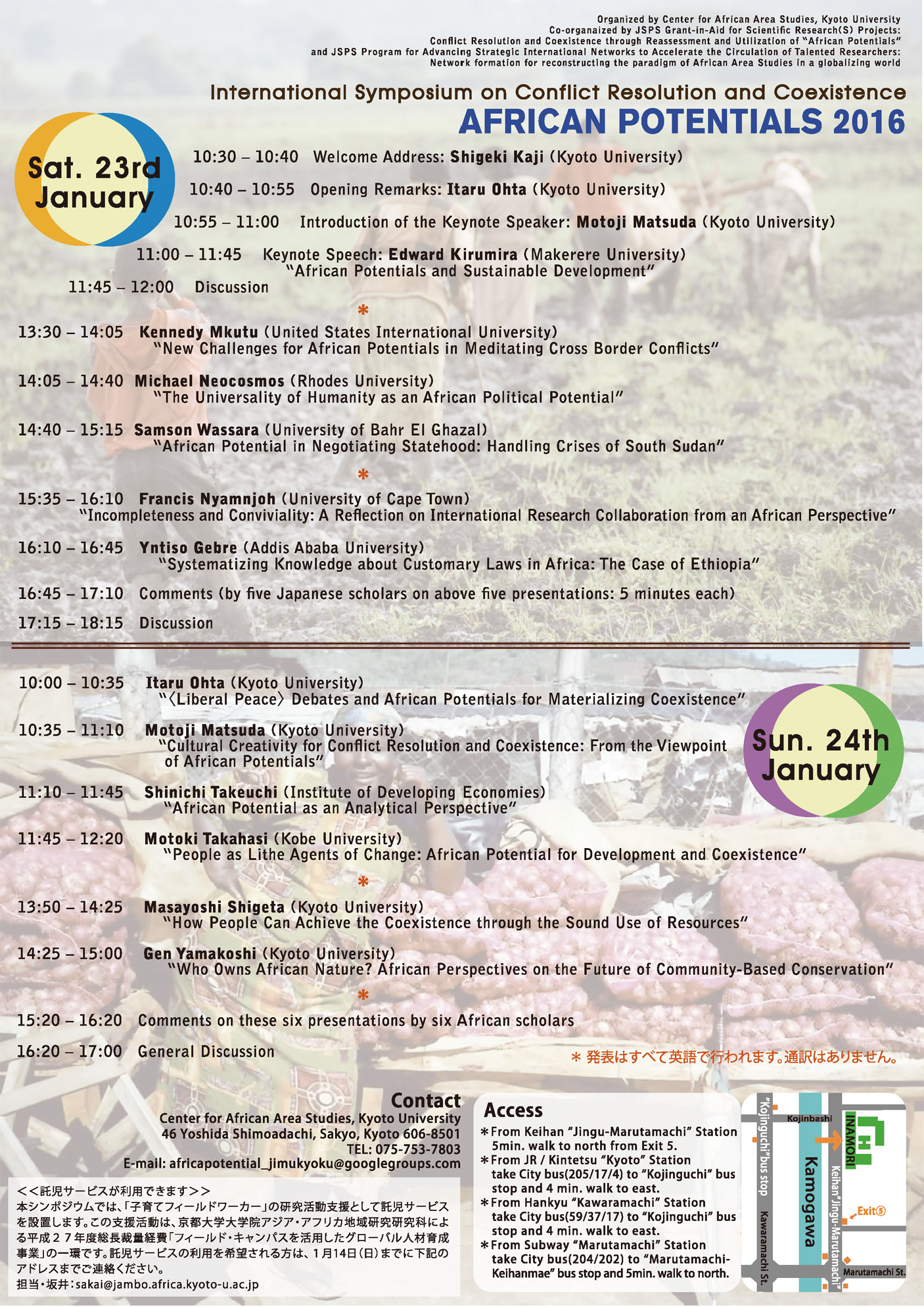
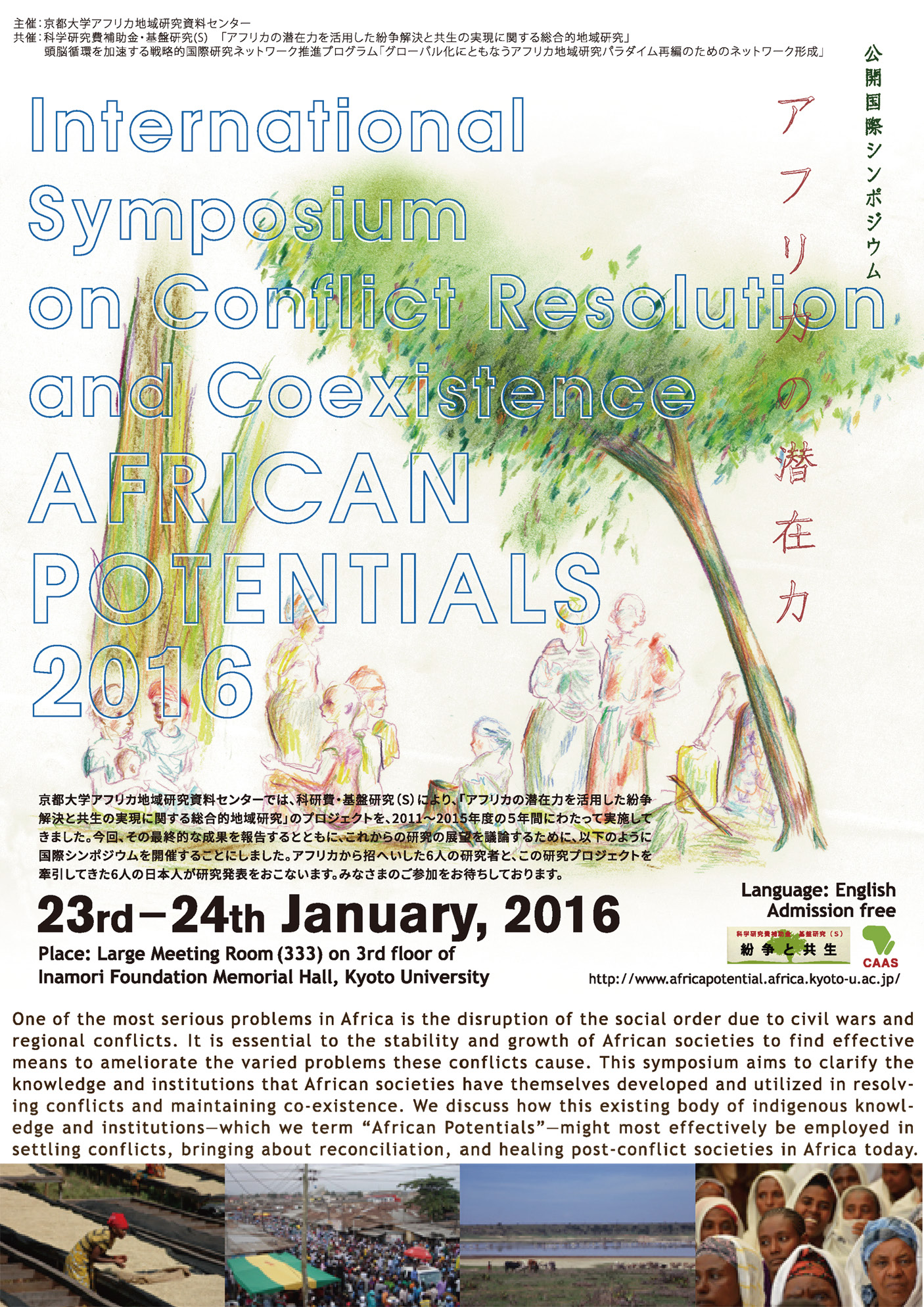
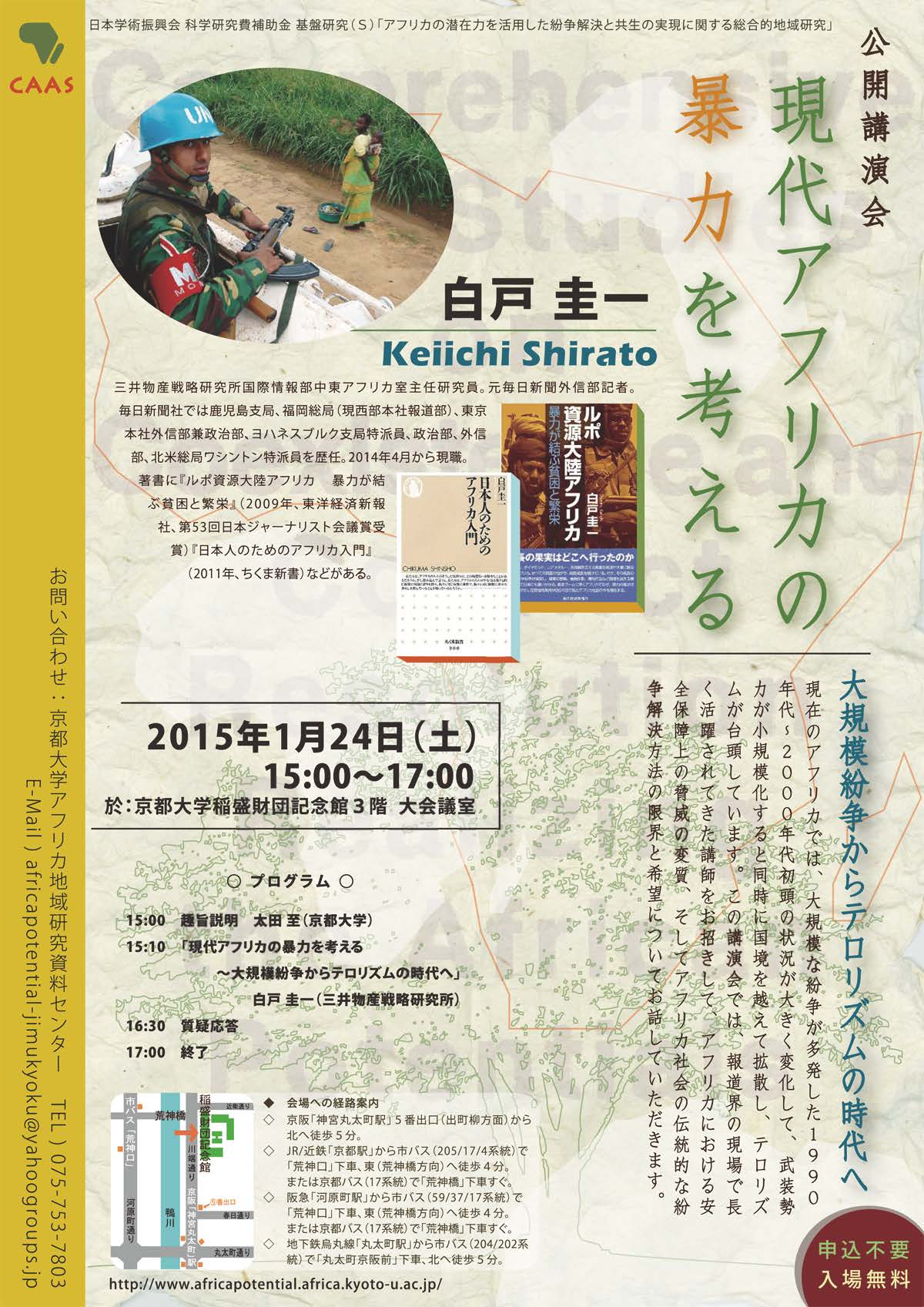
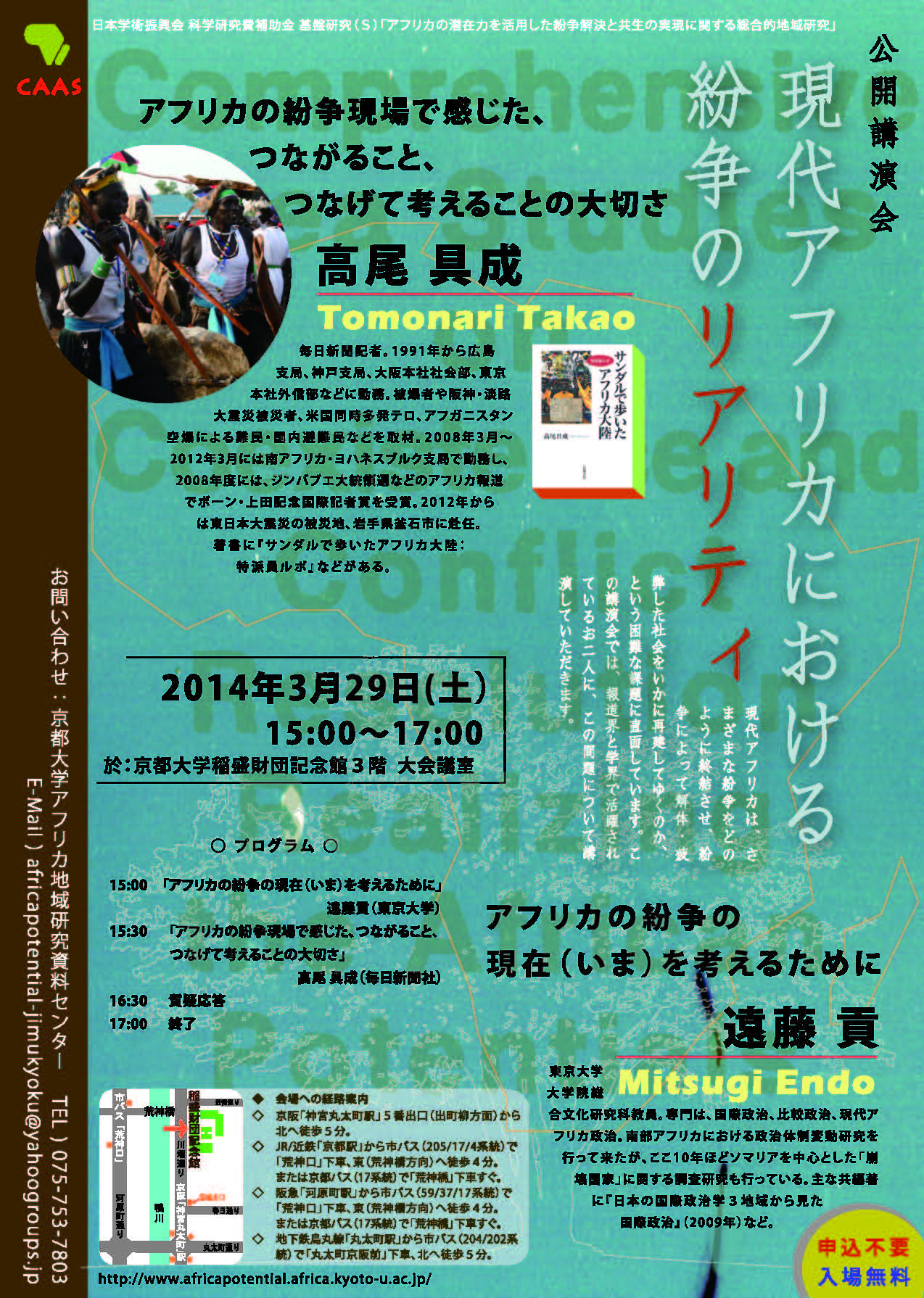
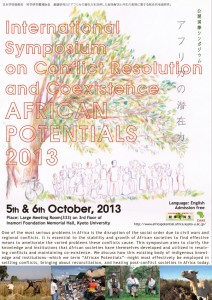

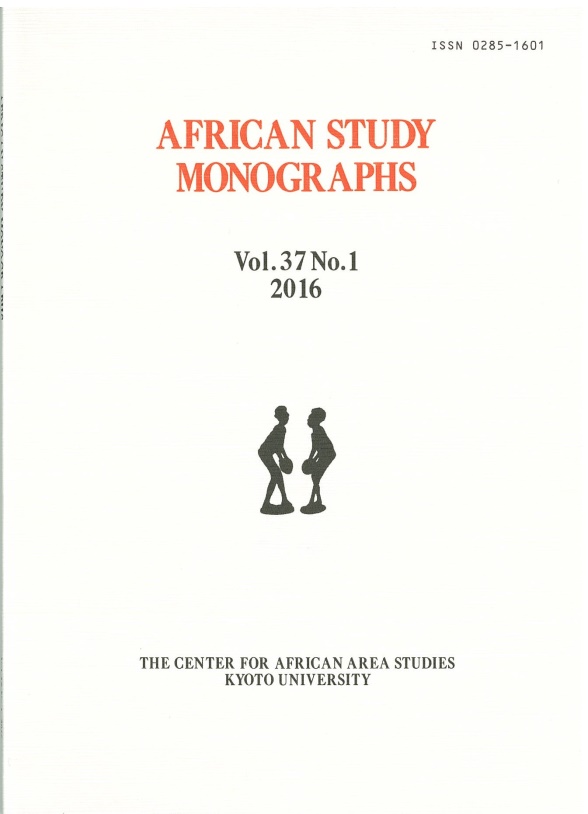
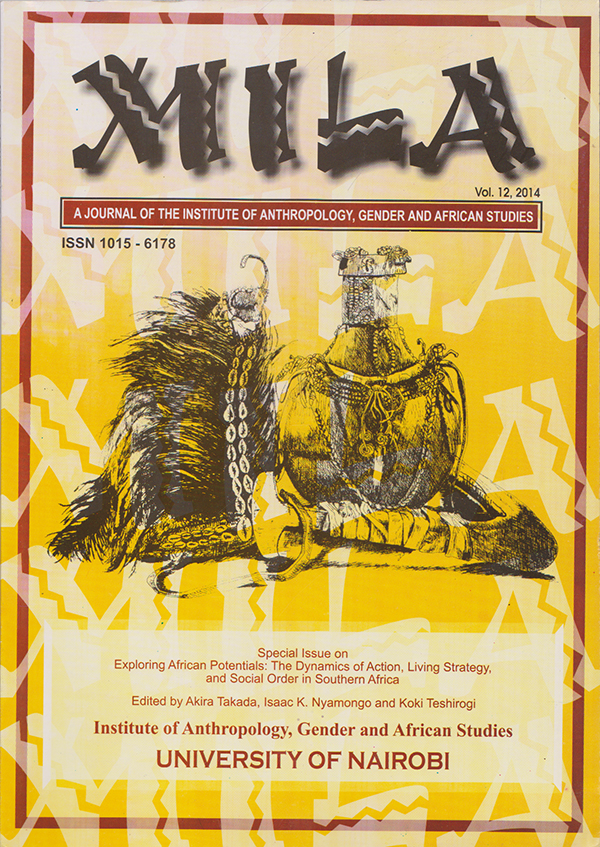 Exploring African Potentials, Mila Special Issue
Exploring African Potentials, Mila Special Issue